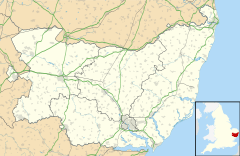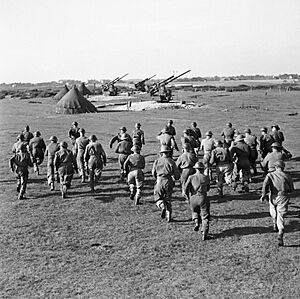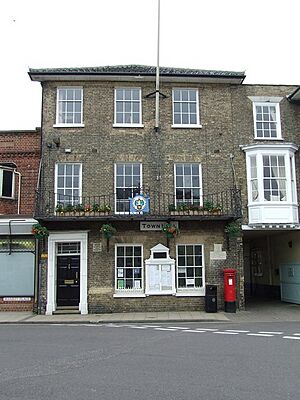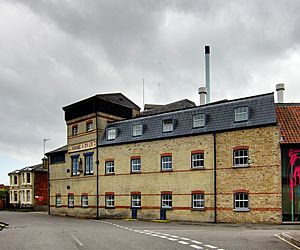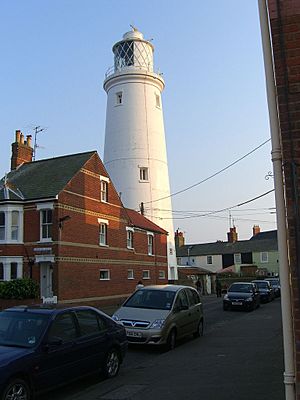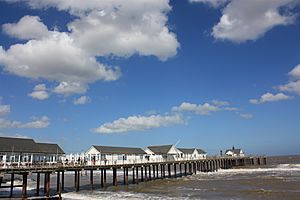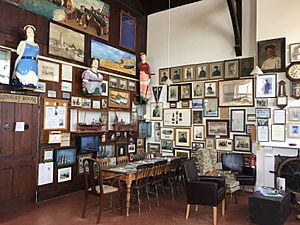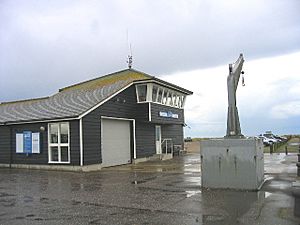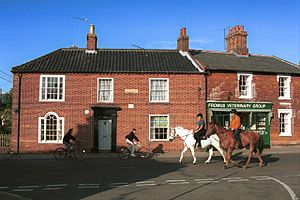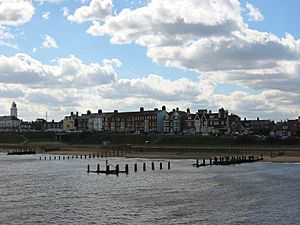Southwold facts for kids
Quick facts for kids Southwold |
|
|---|---|
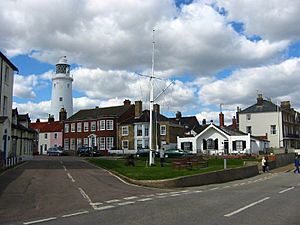 The lighthouse from the North Parade |
|
| Area | 2.68 km2 (1.03 sq mi) |
| Population | 1,098 (2011 Census) |
| • Density | 410/km2 (1,100/sq mi) |
| OS grid reference | TM510763 |
| Civil parish |
|
| District |
|
| Shire county | |
| Region | |
| Country | England |
| Sovereign state | United Kingdom |
| Post town | SOUTHWOLD |
| Postcode district | IP18 |
| Dialling code | 01502 |
| Police | Suffolk |
| Fire | Suffolk |
| Ambulance | East of England |
| EU Parliament | East of England |
| UK Parliament |
|
Southwold is a lovely seaside town and community right on the North Sea coast in Suffolk, England. It's located where the River Blyth meets the sea, in a beautiful area called the Suffolk Coast and Heaths Area of Outstanding Natural Beauty. Southwold is about 11 miles (18 km) south of Lowestoft and 97 miles (156 km) north-east of London. In 2021, about 950 people lived there.
Contents
A Look Back in Time: Southwold's History
Southwold was first mentioned way back in 1086 in the Domesday Book, which was a big survey of England. Back then, it was a busy fishing port. In 1489, King Henry VII gave Southwold its special "town charter." This charter gave the town certain rights and freedoms. Every year, the town celebrates this with the Trinity Fair, where the charter is read aloud.
In the 1630s, some people from Southwold, called Puritans, moved to America to start new lives in the Massachusetts Bay Colony.
A big fire in 1659 destroyed most of the town. This fire actually created open spaces that are now lovely village greens. These greens, along with the surrounding marshes, have helped keep the town looking neat and tidy over the years.
On a green area above the beach, called Gun Hill, you can see six old cannons. These cannons remember the Battle of Sole Bay from 1672. This was a big sea battle between English and French ships against the Dutch navy. The cannons themselves were captured from the Scots at the Battle of Culloden and given to Southwold in 1745. During World War II, they were hidden for safety and brought back afterwards.
On May 15, 1943, during World War II, German planes attacked the town, and sadly, eleven people lost their lives.
How Southwold is Run
Southwold has its own elected Town Council and a Mayor. They work from the Southwold Town Hall. Even though the town is part of a larger district called East Suffolk, the Town Council helps make decisions for the local community.
Southwold's Economy and Jobs
Southwold used to have many different industries, but today, its economy mostly relies on services like hotels, holiday rentals, restaurants, and tourism. It's a key shopping area with many independent shops, cafes, and restaurants. There's also a market on Mondays and Thursdays.
Adnams Brewery is a very important business in Southwold and is the town's biggest employer. While there aren't as many fishing boats as there used to be, Southwold Harbour is still one of the main fishing ports along the Suffolk coast.
Schools in Southwold
Primary Education
Southwold Primary School is for children aged 2 to 11. It works with other schools in the area to provide a good education.
Secondary Education
For older students, the nearest secondary schools are in nearby towns like Beccles and Lowestoft. These schools teach students aged 11 to 16. There is also a private school called Saint Felix School in Reydon, which is close by.
Famous Places and Features
The Old Railway
Southwold once had a special narrow-gauge railway that connected it to Halesworth. It ran from 1879 to 1929. There are now plans to build a new "Railway Park" in Southwold. This park will have a short section of railway track and a museum, bringing some of that railway history back to life.
Southwold Lighthouse
Southwold lighthouse was built in 1890 and became automatic in 1938. It's a tall, white brick building that stands out in the town. It's about 31 meters (102 ft) tall and has 113 steps inside. The lighthouse helps guide ships with its rotating light, which can be seen up to 24 nautical miles (44 km) away. You can even take tours of the lighthouse!
Adnams Brewery
Adnams brewery started in Southwold in 1872. It's the town's largest employer and has been updated over the years to be very energy efficient. They even have a distillery where they make spirits! Adnams is well-known and has won awards for its brewing.
Southwold Pier
Southwold Pier was built in 1900. It used to be much longer, allowing large ships to dock. Over the years, parts of it were damaged, but it was completely rebuilt in 2001. Today, it's about 190 meters (620 ft) long and is a very popular spot. It has fun, unique coin-operated machines made by Tim Hunkin. You might even see old paddle steamers like the PS Waverley visit the pier!
Next to the pier is a model boat pond where people race model yachts. Some of these boats are very old and beautiful.
Water Towers
Southwold has two water towers. The Old Water Tower was built in 1890 and used wind power to pump water. A new, larger Art Deco water tower was built next to it in 1937. The Old Water Tower has been used for different things, including a lifeboat museum.
Electric Picture Palace
The Electric Picture Palace is a cinema that opened in 2002. It looks like the original cinema that was in Southwold back in 1912.
Southwold Museum
The Southwold Museum tells the story of the town's local and natural history. It has many interesting exhibits and is part of a group of maritime museums along the East Coast.
Sailors' Reading Room
The Southwold Sailors' Reading Room was built in 1864. It was a place where fishermen and sailors could go to read and relax, instead of going to pubs. Inside, you can see old model boats and other items related to the sea.
Southwold Golf Club
Southwold Golf Club started in 1884. It was one of the first golf clubs in the area. At first, not everyone could join, but later on, more people were allowed to become members.
St Edmund's Church
St Edmund's Church, Southwold is a beautiful old church that was built between the 1430s and 1490s. It replaced an older church that was destroyed by fire. The church is very important to Southwold's history and is known as one of Suffolk's best churches.
Southwold Harbour
Southwold Harbour is south of the town, on the River Blyth. It's mainly used by fishing boats, yachts, and small pleasure boats. The area in front of the local inn and sailing club is called Blackshore.
At the end of the harbour, near the sea, is the Southwold Lifeboat Station. This is where the RNLI (Royal National Lifeboat Institution) keeps its lifeboats, ready to rescue people at sea. You can also visit the Alfred Corry Museum, which has an old lifeboat called the "Alfred Corry" that was used from 1893 to 1918.
You can cross the river by walking or cycling over a public footbridge upstream from the harbour. This bridge is called the Bailey Bridge. There's also a small ferry service that takes people across the river between Southwold and the village of Walberswick. This ferry has been run by the same family since the 1920s!
Southwold Beach
Southwold Beach is a mix of sand and shingle (small stones). The beach is protected by special coastal defenses to prevent erosion. It's famous for its brightly painted beach huts, which add a lot of color to the coastline.
Southwold in Books and on Screen
Film and Television
Southwold and the areas nearby have been used as filming locations for many movies and TV shows. For example, the BBC children's series Grandpa in My Pocket was filmed here, using the outside of buildings like the Lighthouse. Other shows like Little Britain and Kavanagh QC have also filmed scenes in Southwold.
Novels
Many books have been set in Southwold, sometimes with a different name. For example, Julie Myerson's murder novel Something Might Happen is set in a fictional seaside town that sounds a lot like Southwold. The Bookshop by Penelope Fitzgerald was inspired by her time working in a Southwold bookshop. The German writer W. G. Sebald also wrote about Southwold in his book The Rings of Saturn.
George Orwell
The famous writer George Orwell (whose real name was Eric Blair) lived in Southwold at different times when he was younger and in his thirties. He lived with his parents and wrote some of his early works here, including parts of Burmese Days and A Clergyman's Daughter. You can even see a special plaque on a building where he lived.
Cultural Events
Southwold is a lively town with many cultural events. In the summer, you can enjoy repertory theatre plays at the Southwold Arts Centre. Every November, there's a "Ways with Words" literature festival with interesting speakers. The Southwold Arts Festival, which started in 2014, brings together music, film, and art exhibitions.
Local Media
For local news and TV, Southwold gets its programs from BBC East and ITV Anglia. You can also listen to local radio stations like BBC Radio Suffolk and Heart East. The town's local newspaper is the East Anglian Daily Times.
Famous People from Southwold
Many interesting people have connections to Southwold:
- William Alwyn (1905–1985), a composer, lived here for many years.
- P. D. James (1920–2014), a well-known crime writer.
- George Orwell (1903–1950), the famous writer, lived here with his family.
- Agnes Strickland (1796–1874), a historical writer and poet.
- John Youngs (c. 1598–1672), a minister who founded a town called Southold in New York, USA.
See also
 In Spanish: Southwold para niños
In Spanish: Southwold para niños
 | Victor J. Glover |
 | Yvonne Cagle |
 | Jeanette Epps |
 | Bernard A. Harris Jr. |


